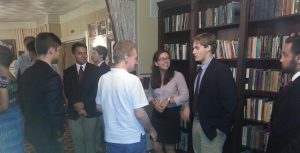On Wednesday evening, August 19, the Alexander Hamilton Institute for the Study of Western Civilization (AHI) gathered students and fellows for a Leadership Dinner that featured Roger Pilon, founder and director of Cato’s Center for Constitutional Studies. Dr. Pilon, one of the foremost libertarian Constitutional scholars in the country, prefaced a lively discussion of constitutional jurisprudence with a brisk and refreshing journey through Western history to discuss the classically liberal philosophy and political theory that shaped the founding of the United States and the framing of the Constitution. He engaged a wide range of student questions on Supreme Court jurisprudence, including such recent cases as King v. Burwell (2015) and Obergefell v. Hodges (2015). In the process, Dr. Pilon discussed interpretative methods of various Supreme Court justices, the use and abuse of the Commerce Clause to expand the regulatory state, and how judges and legal scholars of both the right and the left have betrayed what he regards as the classically liberal principles that informed the original understanding of the Constitution by its framers. The AHI is centering its programming in 2015-2016 on constitutional history and law.

Roger Pilon (center) converses with Will Swett and other AHI Undergraduate Fellows at Leadership Dinner.
Dr. Pilon received a Ph.D. in philosophy from the University of Chicago and a J.D. from George Washington University. In serving as publisher of the highly regarded Cato Supreme Court Review, a journal he helped found in 2001, he has stood at the forefront of an intellectual movement that seeks to “examine those
Dr. Pilon commented on the impressive intellectual range of the AHI’s undergraduate fellows and the high quality of their questions. Before departing, he accepted an invitation from AHI Charter Fellow Robert Paquette to join the AHI’s Board of Academic Advisors. “Roger Pilon brings to the AHI a formidable intellect with a passion for truth seeking and fiery commitment to the protection of individual liberty against the onslaught of Leviathan,” said Paquette. “We look forward to working with him and his wife Juliana, an impressive scholar in her own right and the AHI’s newest senior fellow, to undertake a number of programmatic initiatives in Washington D.C.”

Leave A Comment